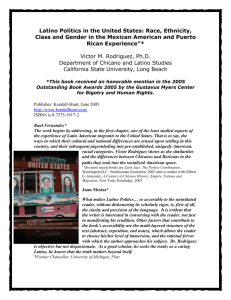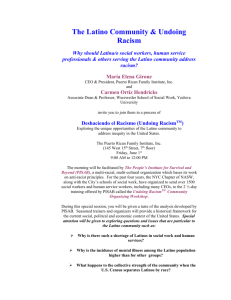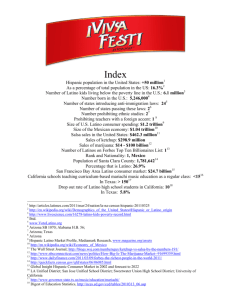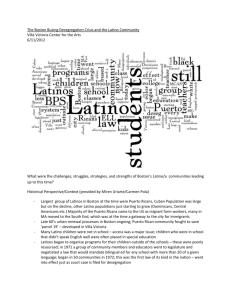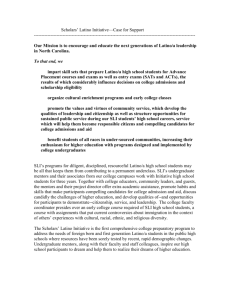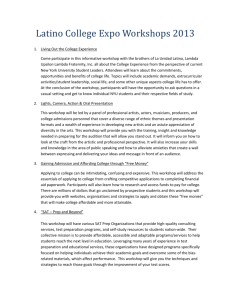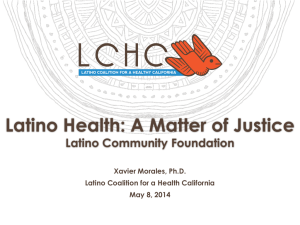Document 10455714
advertisement
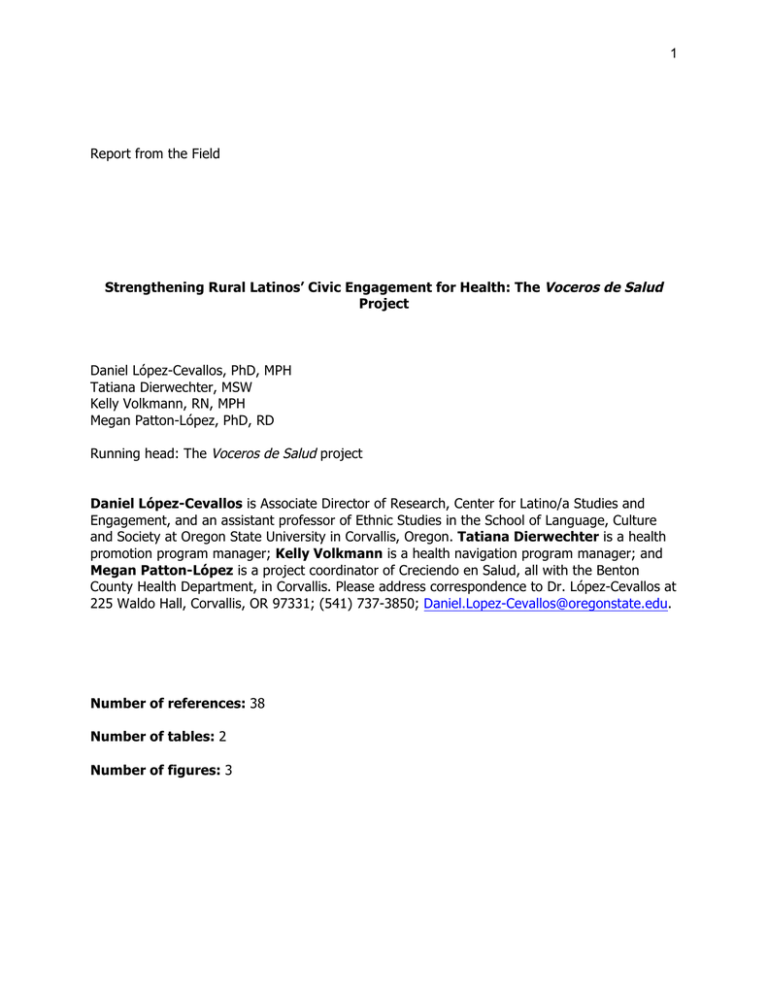
1 Report from the Field Strengthening Rural Latinos’ Civic Engagement for Health: The Voceros de Salud Project Daniel López-Cevallos, PhD, MPH Tatiana Dierwechter, MSW Kelly Volkmann, RN, MPH Megan Patton-López, PhD, RD Running head: The Voceros de Salud project Daniel López-Cevallos is Associate Director of Research, Center for Latino/a Studies and Engagement, and an assistant professor of Ethnic Studies in the School of Language, Culture and Society at Oregon State University in Corvallis, Oregon. Tatiana Dierwechter is a health promotion program manager; Kelly Volkmann is a health navigation program manager; and Megan Patton-López is a project coordinator of Creciendo en Salud, all with the Benton County Health Department, in Corvallis. Please address correspondence to Dr. López-Cevallos at 225 Waldo Hall, Corvallis, OR 97331; (541) 737-3850; Daniel.Lopez-Cevallos@oregonstate.edu. Number of references: 38 Number of tables: 2 Number of figures: 3 2 Summary: This article describes the Latino Health Ambassadors Network (Voceros de Salud) project created to support and mobilize Latino community leaders to address health inequalities in a rural Oregon county. Voceros de Salud is discussed as a model that other rural communities may implement towards strengthening Latino civic engagement for health. Key words: Civic engagement, rural Latinos, health inequalities, minority health, Oregon. 3 Latinos in Oregon are five times more likely to die prematurely than White, non-Hispanic Oregonians. In Benton County, a rural county located in the mid-Willamette valley, the prevalence of diabetes and diabetes–related deaths are also higher for Latinos, contributing to 30% of patients with diabetes.1 This population is often unable to afford basic housing, and its members may live in farm camps or house multiple families in single dwellings. Actions by Immigration and Customs Enforcement officials over recent years and the passage of Oregon Senate Bill 1080 requiring proof of U.S. citizenship or legal immigration status to secure an Oregon driver license or ID card contribute to fears of detainment by government agencies or deportation, even for people with legal residence status. This creates additional anxiety about accessing and advocating for needed services, despite being eligible for them.2, 3 Benton County meets the Oregon Primary Care Office’s criteria for Health Professional Shortage Areas and the Health Resources Services Administration’s designation as a Medically Underserved Area. According to the 2010 Census, approximately 5,757 Latinos live in the county (7% of the total county population). The Latino population in the area grew 57% between 2000 and 2010, and is expected to grow an additional 184% by 2025. Twenty-five percent have incomes below 100% of the federal poverty level. In this community, first- and second-generation Mexican-origin families comprise the majority of the Latino population. Rural Latino families face multiple barriers to accessing and leveraging culturally and linguistically appropriate health and other related services.2-6 In an environment of adversity, powerlessness seems to be the common theme.7, 8 Although much has been written about the importance of empowering disadvantaged populations,9-13 few systematic approaches have been developed to address this issue for rural Latino populations.14, 15 In this context, the Latino 4 Health Ambassador Network or Voceros de Salud* was designed to engage Latino community leaders, through formal trainings, in addressing health inequalities in rural Benton County, Oregon. Using a community-based participatory approach, Voceros de Salud engaged community leaders to promote leadership development skills, assess community needs, and prioritize and implement social action and community mobilization activities.14, 16-18 The Latino Health Ambassadors (Voceros de Salud) Project From 2005-2007, Benton County administered a Latino HIV Integration Project that utilized bicultural, bilingual health educators, Promotores, to provide HIV testing and referral services to Latinos. Funded through the federal Office of Population Affairs, the project was highly successful in building trust with the Latino community and engaging Latinos in local health services. However, the end of the three-year project (September 2007) resulted in an almost complete loss of Latino health outreach capacity in the county. At the time, the Oregon Department of Human Services had just funded Benton County Public Health Department to integrate the chronic care model into clinical services provided through Benton County’s community and migrant health centers. A part-time bilingual, bicultural chronic disease outreach specialist was the only staff that remained; primarily developing referral and tracking mechanisms that would more effectively link Latinos living with diabetes to available chronic disease self-management resources. The impending loss of federal timber payments and the budget cuts made at the beginning of the recent economic recession has affected many Oregon communities, including Benton County. As a result, efforts to secure funding for the above initiatives through county * Participants decided to rename the project Voceros de Salud, which can be translated as “voices for health.” It reminds us, they said, of the “old way” news would be shared around the community (by word of mouth) and also of the importance of standing up and voicing their community and family concerns. 5 general funds, despite the recognition of the critical unmet need these programs fill, have had limited success. In addition, few community organizations currently have the infrastructure to provide public policy capacity building and technical assistance to the Latino community. Other Latino service providers have also experienced significant funding cuts, increasing service needs, and major challenges in maintaining even basic staffing and programming. [Production: Please insert Figure 1 here] At the same time we were actively looking for ways to build capacity within the local health department, we found necessary to strengthen Latino capacity outside our organization (i.e., the broader community). Building on the Benton County Health Department (BCHD)’s previous programming efforts in engaging the Latino community, the Voceros de Salud project, funded by a CBPR Capacity Building Grant from Northwest Health Foundation, developed a network of rural community leaders in Benton County, Oregon. An interdisciplinary team of community and academic partners with an established history of collaboration and trust in the local Latino community was brought together for the project (see Figure 1). Voceros de Salud provided training for seven local “natural leaders” identified via partner community-based organizations, namely Casa Latinos Unidos de Benton County, Iglesia Santa María, the Latino PTOs with Lincoln and Garfield Elementary Schools (Corvallis), and the Linn-Benton Hispanic Advisory Committee. A demographic profile of our participants is shown on Table 1. Two academic institutions (Oregon State University and Western Oregon University) provided training and evaluation support. BCHD was the lead agency for the project and managed funding and reporting. [Production: Please insert Table 1 here] Project design. The theoretical framework for the Voceros de Salud project was built on three key concepts. First, the socio-ecological framework, which focuses on exploring how 6 social systems function and change, community mobilization, and addressing individual, group, institutional, and community issues.19 Second, community organizing emphasizes a communitydriven approach to addressing community needs. In this context, building empowerment and leadership are relevant to sustaining community capacity.20 A related concept, social capital, is the third construct needed to complement our understanding of the social transformation the Latino community would need to undergo to effect change.13, 21 Popular education was included in the model as a tool for enhancing empowerment and improving health.22 The Voceros de Salud program sought to increase the Voceros’ human capital, which in turn would translate into increased social capital in their communities.23 The logic model (Figure 2) provides a succinct overview of the project. [Production: Please insert Figure 2 here] The objectives of the LHAN project were: 1) to develop what we called a Latino Health Ambassador Network (Voceros de Salud) to build the capacity of local Latino community members to engage in community health planning and program development, public policy, research, and resource allocation efforts; 2) to promote empowerment, leadership development, and skills building among Latino community members to develop and advocate for effective community interventions that influence individual and community health; and 3) to assess community needs and prioritize and implement social action and community mobilization activities that address health inequalities among Latinos living in Benton County, OR. The project’s anticipated short-term outcome of increasing knowledge and skills of Latino community members to engage in public policy efforts may be instrumental in advocating for the needs of Latino communities and avoiding loss of critical health and social services in the future.23 Building the capacity of Latino leaders (using practices founded in adult learning theory) to become more engaged in public policy will in turn support long-term efforts 7 to address health and other social inequalities among Latinos.20, 24 Building leadership skills, empowerment, and confidence of existing and emerging Latino community leaders to play a larger role in representing the needs, experiences, and strengths of Latino families is critical to ensuring health equity for all of the region’s residents.25 Figure 3 places the newly trained Voceros de Salud in the broader community and health care system context. In the health care setting, Voceros can be critical to connect community members with clinical health navigators who can serve as the point of entry into the broader health care system.26 This is particular relevant as the implementation of the federal Affordable Care Act of 2010 takes places at the state level. In our region, a tri-county Coordinated Care Organization (CCO, the Oregon equivalent of an ACO – Affordable Care Organization) was recently approved to serve Benton, Linn and Lincoln counties. A key feature of the CCOs is the opportunity for community input via a Community Advisory Board, a venue relevant for Latino involvement. [Production: Please insert Figure 3 here] Voceros de Salud training. The Latino Health Ambassadors Network (LHAN) formally engaged selected Latino community leaders in a semi-structured curriculum, based on previous literature23, 27 and input from community partners and the Voceros de Salud themselves. Table 2 provides a brief description of each of the sessions included in our training. All but two sessions focused on building an understanding of socio-ecological processes (e.g., we translated and adapted Frieden’s Health Impact Pyramid28 and the RWJF “Ramona and friends” presentation to highlight policy, environmental and systems change); civic engagement, leadership, advocacy (facilitated by Multnomah Community Capacitation Center Promotoras, and following a Popular Education framework for health promotion and community empowerment); community assets and local resources (facilitated by a BCHD Promotora).7, 22 The last two sessions were included 8 per request of the group to address relevant issues of the time (Census 2010, H1N1 prevention). We offered childcare and food for all sessions, which were conducted in Spanish. The Voceros de Salud were compensated for attending the training sessions ($20 gift-card per session). [Production: Please insert Table 2 here] Lessons learned. A recent report of the WHO Commission on the Social Determinants of Health points out the need to increase empowerment for disadvantaged populations (organization, fair representation and participation in decision-making) as “an integral feature of the right to health.”29 [p.160] This paper describes the Latino Health Ambassadors Network (Voceros de Salud) project developed to support and mobilize Latino community leaders to address health inequalities in one rural Oregon County. As mentioned above, our intention with this project was to build Latino community capacity outside of specific institutions. Training these seven local Latino leaders has been very fruitful for our community. The Voceros de Salud managed to interact with a number of local organizations, including Lincoln Elementary School, Casa Latinos Unidos, Philomath Elementary School, Hispanic Advisory Committee, and Corvallis Livability Coalition. One of our Voceros de Salud was recently appointed to the Benton County Community Health Center Board of Directors; while another served as president of the Lincoln Elementary School Latino PTO. One of our female Vocera has been part of Organización de Latinas Unidas, a group of Latino women who meet regularly to discuss personal and community issues, and has hosted local Latino festivals for the past two years. They receive support from the non-profit Casa Latinos Unidos de Benton County. The Voceros de Salud involvement also informed the development of two successful proposals led by Benton County Health Department: Creciendo en Salud and Alianza Igualdad funded by Robert Wood Johnson Foundation’s Healthy Kids, Healthy Communities Initiative; and the Oregon Office of Equity and 9 Inclusion, respectively. Although both projects are currently underway, we have evidence of increased community involvement in local decision-making regarding parks & recreation, access to local healthy food, and educational advancement for Latino children. More recently, Oregon State University’s Extension Service developed a similar project in neighboring Linn County. The Poder Comunitario project, funded by the Outreach Collaborative for a Healthy Oregon initiative, seeks to build local Latino civic engagement for health promotion. Despite these successes, we learned that various challenges lie ahead for Latino engagement in our county and beyond. The significant increase of Latinos in rural communities across the country brings a host of challenges to institutions unable or unprepared to address their health and other needs.2, 3 A recent survey of farmworkers (most of them Latinos) in Washington state found that 30% of the farmworkers reported that they donated money, 16% time, and 12% attended a public meeting or rally that addressed local issues. Time constraints (72%) were cited as the major reason for lack of involvement in community affairs.30 Another lesson learned is that, in the midst of an economic recession, funding for this type of initiative is scarce. As we have witnessed it ourselves, limited funding undermines longterm planning and sustainability, and reduces the scope of project implementation and evaluation. From a systems perspective, however, it is necessary to create spaces within the public process (at schools, health centers, child care facilities, workplace, local government, etc.) for Latino families to participate. In other words, what are often thought of as simple details such as day/time of events, venue, language, or presentation style, can become central barriers that undermine the possibility of an inclusive and equitable public process.31, 32 The massive and peaceful demonstrations for Immigration Reform across major US cities in spring of 2006 showed that Latinos are capable of organizing and taking civic action.33, 34 In addition, garnering the support of mainstream community leaders is imperative to the 10 successful articulation of Latino civic engagement, particularly in rural areas.23, 35 Also, it is important to support civic engagement of Latino youth36, 37 and foster the participation of Latino parents, which will likely translate in increasing involvement of their children.35, 38, 39 Ultimately, strengthening Latino civic engagement, despite the evident challenges, will have positive benefits for overall community health and well being.22, 23, 33 11 Acknowledgments We would like to thank Rocío Muñoz, Health Navigator; and Nicole Burda, Health Promotion intern, Benton County Health Department, for their valuable assistance. Also, we are grateful to Teresa Ríos, Samantha Kaan and Noelle Wiggins, Multnomah Community Capacitation Center; Will Adan, Census Outreach Worker; and Francisco Arguelles, Colectivo Flatlander, for their support in the development and implementation of our training curriculum. The Voceros de Salud Project was funded by the Northwest Health Foundation CBPR Capacity Building Grant. 12 References 1. 2. 3. 4. 5. 6. 7. 8. 9. 10. 11. 12. 13. 14. 15. 16. 17. Ngo D, Leman R. Keeping Oregonians Healthy: Preventing Chronic Diseases by Reducing Tobacco Use, Improving Diet, and Promoting Physical Activity and Preventive Screenings. Portland, OR: Oregon Department of Human Services; 2007. Galarneau C. Still Missing: Undocumented Immigrants in Health Care Reform. J Health Care Poor Underserved. 2011;22(2):422-428. Pérez-Escamilla R, Garcia J, Song D. Health Care Access Among Hispanic Immigrants: ¿Alguien Está Escuchando?[Is Anybody Listening?]. NAPA Bull. 2010;34(1):47-67. Ortega AN, Fang H, Perez VH, et al. Health Care Access, Use of Services, and Experiences Among Undocumented Mexicans and Other Latinos. Arch Intern Med. 2007;167(21):2354-2360. Cavazos-Rehg PA, Zayas LH, Spitznagel EL. Legal status, emotional well-being and subjective health status of Latino immigrants. J Natl Med Assoc. 2007;99(1126-1131). Berk M, Schur C. The Effect of Fear on Access to Care Among Undocumented Latino Immigrants. J Immigr Health. 2001;3(3):151-156. Wiggins N, Johnson D, Avila M, et al. Using popular education for community empowerment: perspectives of Community Health Workers in the Poder es Salud/Power for Health program. Crit Public Health. 2009;19(1):11-22. Ruiz E. Understanding Latina Immigrants Using Relational Cultural Theory. Women Ther. 2012;35(1-2):68-79. Commission on Social Determinants of Health. Closing the gap in a generation: Health equity through action on the social determinants of health. Geneva: World Health Organization; 2008. Jeris L, Gajanayake J, Ismail J, et al. Grassroots Empowerment Of Women: Portraits Of Four Villages In Sri Lanka. Convergence. 2006;39(1):61-75. Wallack L. Media Advocacy: A Strategy for Empowering People and Communities. J Public Health Policy. 1994;15(4):420-436. Yoo S, Butler J, Elias TI, Goodman RM. The 6-Step Model for Community Empowerment: Revisited in Public Housing Communities for Low-Income Senior Citizens. Health Promot Pract. 2009;10(2):262-275. Minkler M. Community organizing and community building for health. New Brunswick, N.J.: Rutgers University Press; 1997. Farquhar SA, Michael YL, Wiggins N. Building on Leadership and Social Capital to Create Change in 2 Urban Communities. Am J Public Health. 2005;95(4):596601. Diversi M, Mecham C. Latino(a) students and Caucasian mentors in a rural afterschool program: Towards empowering adult–youth relationships. J Community Psychol. 2005;33(1):31-40. Putnam RD, Leonardi R, Nanetti RY. Making democracy work: civic traditions in Modern Italy. Princeton, NJ: Princeton University Press; 1993. Ritas C. Speaking Truth, Creating Power: A Guide to Policy Work for Community-Based Participatory Research Practitioners. New York: Hunter 13 18. 19. 20. 21. 22. 23. 24. 25. 26. 27. 28. 29. 30. 31. 32. 33. College Center on AIDS, Drugs and Community Health & Community-Campus Partnerships for Health; 2003. Israel BA, Schulz AJ, Parker EP, Becker AB. Community-based Participatory Research: Policy Recommendations for Promoting a Partnership Approach in Health Research. Educ Health. 2001;14(2):182 - 197. National Cancer Institute. Theory at a Glance: A Guide for Health Promotion Practice. 2nd ed. Washington, D.C.: Author; 2005. Minkler M, Vasquez VB, Tajik M, Petersen D. Promoting Environmental Justice Through Community-Based Participatory Research: The Role of Community and Partnership Capacity. Health Educ Behav. 2008;35(1):119-137. Kawachi I, Subramanian SV, Kim D. Social Capital and Health. In: Kawachi I, Subramanian SV, Kim D, eds: Springer New York; 2008:1-26. Wiggins N. Popular education for health promotion and community empowerment: a review of the literature. Health Promot Int. 2012;27(3):356-371. Michael Y, Farquhar S, Wiggins N, Green M. Findings from a Community-based Participatory Prevention Research Intervention Designed to Increase Social Capital in Latino and African American Communities. J Immigr Minor Health. 2008;10(3):281-289. Wallerstein N, Bernstein E. Empowerment Education: Freire's Ideas Adapted to Health Education. Health Educ Behav. 1988;15(4):379-394. Salsberg J, Louttit S, McComber AM, et al. Knowledge, capacity, and readiness: Translating successful experiences in community-based participatory research for health promotion. Pimatisiwin. 2008;5(2):125-150. Volkmann K, Castañares T. Clinical Community Health Workers: Linchpin of the Medical Home. J Ambul Care Manage. 2011;34(3):221-233. Wallerstein N, Sanchez-Merki V. Freirian praxis in health education: research results from an adolescent prevention program. Health Educ Res. 1994;9(1):105118. Frieden TR. A Framework for Public Health Action: The Health Impact Pyramid. Am J Public Health. 2010;100(4):590-595. Commission on Social Determinants of Health. Closing the gap in a generation: Health equity through action on the social determinants of health. Geneva: World Health Organization; 2008. Washington State Farmworker Housing Trust. A Sustainable Bounty: Investing in our Agricultural Future, Washington State Farmworker Survey. Seattle, WA: Author; 2008. Dotson-Blake K, Foster V, Gressard C. Ending the Silence of the Mexican Immigrant Voice in Public Education: Creating Culturally Inclusive Family-SchoolCommunity Partnerships. Prof Sch Counseling. 2009;12(3):230-239. Minkler M, Garcia A, Williams J, LoPresti T, Lilly J. Sí Se Puede: Using Participatory Research to Promote Environmental Justice in a Latino Community in San Diego, California. J Urban Health. 2010;87(5):796-812. Bada X, Fox J, Donnelly R, Selee A. Context Matters: Latino Immigrant Civic Engagement in Nine U.S. Cities. Washington, DC: Woodrow Wilson International Center for Scholars; 2010. 14 34. 35. 36. 37. 38. 39. Bada X, Fox J, Selee A. Invisible No More: Mexican Migrant Civic Participation in the United States. Washington, DC: Mexico Institute, Woodrow Wilson International Center for Scholars; 2006. McBride AM, Sherraden MS, Pritzker S. Civic Engagement Among Low-Income and Low-Wealth Families: In Their Words. Fam Relat. 2006;55(2):152-162. Torney-Purta J, Barber C, Wilkenfeld B. Latino Adolescents’ Civic Development in the United States: Research Results from the IEA Civic Education Study. J Youth Adolesc. 2007;36(2):111-125. Stepick A, Stepick CD. Becoming American, Constructing Ethnicity: Immigrant Youth and Civic Engagement. Appl Dev Sci. 2002;6(4):246 - 257. Fletcher AC, Glen H, Elder, Jr., Mekos D. Parental Influences on Adolescent Involvement in Community Activities. J Res Adolesc. 2000;10(1):29 - 48. Jasis PM, Ordoñez-Jasis R. Latino Parent Involvement. Urban Educ. 2012;47(1):65-89. 15 Table 1. Voceros de Salud Socio-Demographic Profile (n=7). Socio-demographic characteristics Age (years) Mean (SD) % (n) 34.0 (8.3) Female 29 (2) Born in Mexico 86 (6) Years in the US 11.2 (7.9) Less acculturated 86 (6) Childhood lived only/primarily in Latin America Currently employed 86 (6) 71 (5) Total family income (n= 5) $10,001 - $25,000 20 (1) $25,001 - $50,000 60 (3) $More than $50,000 20 (1) Educational level High school 43 (3) Some university 14 (1) University 43 (3) Usual source of care/information Doctor’s office/clinic 29 (2) Health department 42 (3) Other* 29 (2) Healt h care visits during last two years Healt h insurance Private insurance through employer None Fair/poor health status * Internet, Voceros de Salud. 3.8 (2.9) 71 (5) 29 (2) 29 (2) 16 Table 2. Voceros de Salud Program Training Curriculum (Benton County, Oregon, 2008-2010). Name of session Description Socio-Ecological Framework Overview of the social-ecological (SE) framework using Frieden’s Health Impact Pyramid and local case studies to promote discussions about policy, environmental and systems change. Popular Education Popular education theory and methods. Participants identified ways that they can use these strategies within their family and community networks. Community Assets Mapping Identifying organizations serving the Latino community in different areas of Benton County. Community and Clinical Resources Overview of Benton County’s Promotores de Salud Program, and the Annual Benton County Community Soccer Tournament and Family Weekend. Clinical services available through the Community Health Centers of Benton and Linn Counties and the process for enrolling as a new patient. Oregon Health Plan (OHP) Outreach Worker, reviewed OHP eligibility, and myths and realities about applying and using these health benefits. Leadership I Exploring different leadership styles, the ways that the Voceros de Salud are already leaders, and avenues for increasing their leadership skills. Leadership II Defining different types of leaders and acknowledge the importance of life experiences as professional development. Public Health Policy 101 A brief introduction to the different levels of policy. An adapted version of the slides used by the Robert Wood Johnson Foundation: Healthy Kids, Healthy Communities “Ramona and her friends” were used to tell the story of the potential impact of changing policies. Advocacy Exploring various advocacy styles, and how the Voceros de Salud are already advocating for their community. Facilitators demonstrated different scenarios on how to approach specific situations. Civic Engagement Reflecting on the Voceros de Salud current efforts and how to take all their leadership skills and knowledge “to the next level.” Using popular education techniques, it was demonstrated how “power” plays in the roles of bureaucracy positions and the ways the Voceros can make a positive impact. Census 2010 Q & A session designed to increase knowledge about the upcoming census and decrease fear and suspicion about how census data is used (included in response to community concerns). H1N1 2010 Critical information about anticipated H1N1 flu season and how to prepare themselves, their families, and their communities (included in response to community concerns). 17 Figure 1. Voceros de Salud Project Network (Benton County, Oregon, 2008-2010). 18 Inputs Theoretical Framework Socio-ecological framework Community-level Funding Community organizing - Empowerment - Leadership - Popular education Interns Social Capital - Community Participation - Agency - Trust Activities Outputs Recruiting Voceros Number of Voceros Training Voceros - Socio-ecological framework - Popular education - Assets mapping - Community & clinical resources - Leadership - Civic engagement - Advocacy - Public health policy 101 Number of trainings Staff Volunteers Supplies for trainings Workshop speakers Collaborating institutions Follow-up Assessment Assumptions - Latino community trusts Voceros - Latino voices are not heard by policymakers - Latino community lacks knowledge of community resources Number of training attendees Voceros' participation in assessment & policy efforts Log of community & institutional contacts Short-term Outcomes - Impact Mid-term Long-Term Increase Knowledge & Skills of Voceros in regards to community organizing and participation Expand & strenghten Voceros' networks Increase trust between Latino community and local institutions Increase Voceros engagement in local public policy Increase Voceros' knowledge of local institutions; and health & social policies Increase visibility of the Voceros de Salud in the community Increase participation of Latino community in local policy & decision-making External factors - Few opportunities for Latinos to participate in policymaking or community life - There is fear of voicing concerns (partially related to immigration issues) Figure 2. Voceros de Salud Project Logic Model (Benton County, Oregon, 2008-2010). 19 Figure 3. Community-Health Care System Model (Benton County, Oregon, 20082010).
